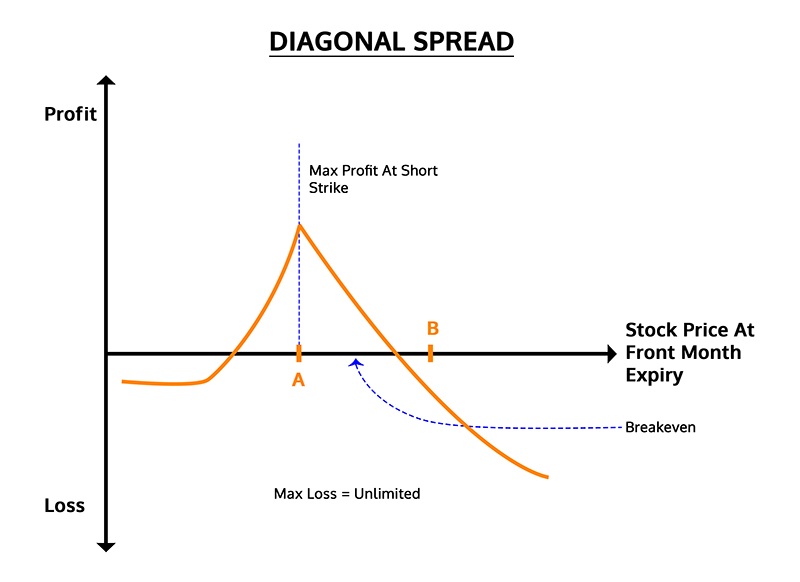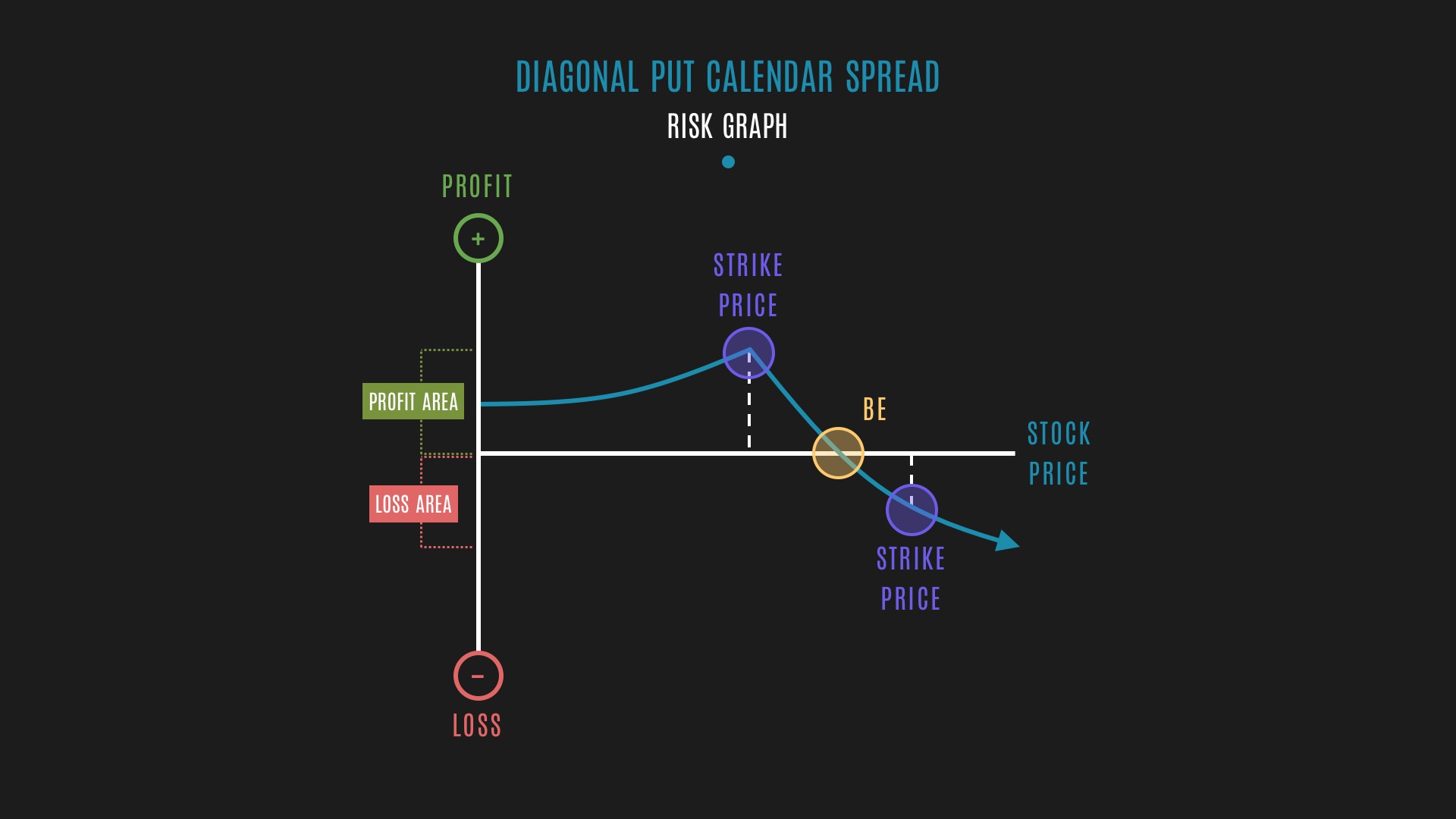Diagonal Calendar Spread
Diagonal Calendar Spread - Web one reason to like trading diagonal spreads is that they lend themselves to numerous position adjustments during the trading process. It is an options strategy established by simultaneously entering into a long and short position in two options of the same type—two call options or two put options—but with different strike prices and different expiration dates. A diagonal calendar spread uses different strike prices for the two options positions. Web the short diagonal calendar put spread is one of two types of short calendar spreads utilizing only put options. Web a diagonal spread is similar to a calendar spread with the only difference being that the strikes are different. Web the diagonal calendar call spread, also known as the calendar diagonal call spread, is a neutral options strategy that profits when the underlying stock remains within a. Web the diagonal spread is an option spread strategy that involves the simultaneous purchase and sale of equal number of options of the same class, same underlying security with. Web the diagonal spread is a popular options trading strategy that involves the simultaneous purchase and sale of options of the same type but with different strike prices and. Web a diagonal spread is a hybrid of a bull call spread or a bear put spread, combined with a calendar spread. The other one is the short horizontal calendar put spread. The spread is known as diagonal spread as it. Web how does diagonal calendar put spread work in options trading? Web a diagonal spread is similar to a calendar spread with the only difference being that the strikes are different. Web the diagonal spread is a popular options trading strategy that involves the simultaneous purchase and sale of options of. A diagonal spread is a modified calendar spread involving different strike prices. Web diagonal calendar spread. Web (april 2020) in finance, a calendar spread (also called a time spread or horizontal spread) is a spread trade involving the simultaneous purchase of futures or options expiring on a. Web the diagonal spread is an option spread strategy that involves the simultaneous. Web a diagonal spread is a hybrid of a bull call spread or a bear put spread, combined with a calendar spread. Here's a screenshot of what would officially be called a calendar. Web (april 2020) in finance, a calendar spread (also called a time spread or horizontal spread) is a spread trade involving the simultaneous purchase of futures or. Here's a screenshot of what would officially be called a calendar. Web a diagonal spread is a hybrid of a bull call spread or a bear put spread, combined with a calendar spread. Web the diagonal calendar call spread, also known as the calendar diagonal call spread, is a neutral options strategy that profits when the underlying stock remains within. Web the short diagonal calendar put spread is one of two types of short calendar spreads utilizing only put options. Web the diagonal spread is an option spread strategy that involves the simultaneous purchase and sale of equal number of options of the same class, same underlying security with. A diagonal spread is a modified calendar spread involving different strike. Web if two different strike prices are used for each month, it is known as a diagonal spread. Web how does diagonal calendar put spread work in options trading? Web one reason to like trading diagonal spreads is that they lend themselves to numerous position adjustments during the trading process. Web (april 2020) in finance, a calendar spread (also called. Web the diagonal spread is an option spread strategy that involves the simultaneous purchase and sale of equal number of options of the same class, same underlying security with. Web the diagonal spread is a popular options trading strategy that involves the simultaneous purchase and sale of options of the same type but with different strike prices and. For example,. Web a diagonal spread is a hybrid of a bull call spread or a bear put spread, combined with a calendar spread. Web if two different strike prices are used for each month, it is known as a diagonal spread. Web (april 2020) in finance, a calendar spread (also called a time spread or horizontal spread) is a spread trade. Web a call diagonal spread is a combination of a bear call credit spread and a call calendar spread. The diagonal calendar put spread, also known as the put. Web (april 2020) in finance, a calendar spread (also called a time spread or horizontal spread) is a spread trade involving the simultaneous purchase of futures or options expiring on a.. Web the diagonal calendar call spread, also known as the calendar diagonal call spread, is a neutral options strategy that profits when the underlying stock remains within a. Web (april 2020) in finance, a calendar spread (also called a time spread or horizontal spread) is a spread trade involving the simultaneous purchase of futures or options expiring on a. Web. Web the diagonal calendar call spread, also known as the calendar diagonal call spread, is a neutral options strategy that profits when the underlying stock remains within a. Web a diagonal spread is similar to a calendar spread with the only difference being that the strikes are different. For example, say we initiate. Web the diagonal spread is an option spread strategy that involves the simultaneous purchase and sale of equal number of options of the same class, same underlying security with. Web one reason to like trading diagonal spreads is that they lend themselves to numerous position adjustments during the trading process. The other one is the short horizontal calendar put spread. The spread is known as diagonal spread as it. Web diagonal calendar spread. Web if two different strike prices are used for each month, it is known as a diagonal spread. Web the short diagonal calendar put spread is one of two types of short calendar spreads utilizing only put options. It is an options strategy established by simultaneously entering into a long and short position in two options of the same type—two call options or two put options—but with different strike prices and different expiration dates. Web (april 2020) in finance, a calendar spread (also called a time spread or horizontal spread) is a spread trade involving the simultaneous purchase of futures or options expiring on a. The diagonal calendar put spread, also known as the put. Here's a screenshot of what would officially be called a calendar. Web a diagonal spread is a hybrid of a bull call spread or a bear put spread, combined with a calendar spread. Web the diagonal spread is a popular options trading strategy that involves the simultaneous purchase and sale of options of the same type but with different strike prices and. A diagonal calendar spread uses different strike prices for the two options positions. Web how does diagonal calendar put spread work in options trading? A diagonal spread is a modified calendar spread involving different strike prices. Web a call diagonal spread is a combination of a bear call credit spread and a call calendar spread. Web (april 2020) in finance, a calendar spread (also called a time spread or horizontal spread) is a spread trade involving the simultaneous purchase of futures or options expiring on a. Web the diagonal spread is a popular options trading strategy that involves the simultaneous purchase and sale of options of the same type but with different strike prices and. Web a diagonal spread is similar to a calendar spread with the only difference being that the strikes are different. Web one reason to like trading diagonal spreads is that they lend themselves to numerous position adjustments during the trading process. Web if two different strike prices are used for each month, it is known as a diagonal spread. The spread is known as diagonal spread as it. It is an options strategy established by simultaneously entering into a long and short position in two options of the same type—two call options or two put options—but with different strike prices and different expiration dates. Here's a screenshot of what would officially be called a calendar. A diagonal calendar spread uses different strike prices for the two options positions. Web a call diagonal spread is a combination of a bear call credit spread and a call calendar spread. The other one is the short horizontal calendar put spread. A diagonal spread is a modified calendar spread involving different strike prices. Web the short diagonal calendar put spread is one of two types of short calendar spreads utilizing only put options. The diagonal calendar put spread, also known as the put. Web the diagonal calendar call spread, also known as the calendar diagonal call spread, is a neutral options strategy that profits when the underlying stock remains within a. For example, say we initiate.kthwow calendar spread, diagonal spread, box spread
Diagonal Spread Options Trading Strategy In Python
Pin on Double Calendar Spreads and Adjustments
DIAGONAL WEEKLY CALENDAR WITH ADJUSTMENTS WEEKLY CALENDAR SPREAD
Calendar Diagonal Option Spread [Why FB]? YouTube
Glossary Archive Tackle Trading
Case Study Goldman Sachs Double Calendar and Double Diagonal
Glossary Diagonal Put Calendar Spread example Tackle Trading
Diagonal Call Calendar Spread Smart Trading
Pin on CALENDAR SPREADS OPTIONS
Web How Does Diagonal Calendar Put Spread Work In Options Trading?
Web A Diagonal Spread Is A Hybrid Of A Bull Call Spread Or A Bear Put Spread, Combined With A Calendar Spread.
Web Diagonal Calendar Spread.
Web The Diagonal Spread Is An Option Spread Strategy That Involves The Simultaneous Purchase And Sale Of Equal Number Of Options Of The Same Class, Same Underlying Security With.




![Calendar Diagonal Option Spread [Why FB]? YouTube](https://i.ytimg.com/vi/qjfTMDLcmew/maxresdefault.jpg)




